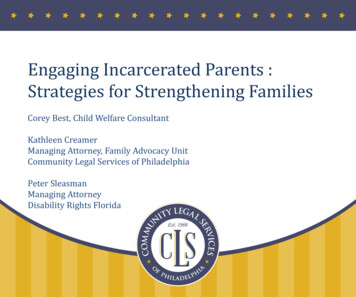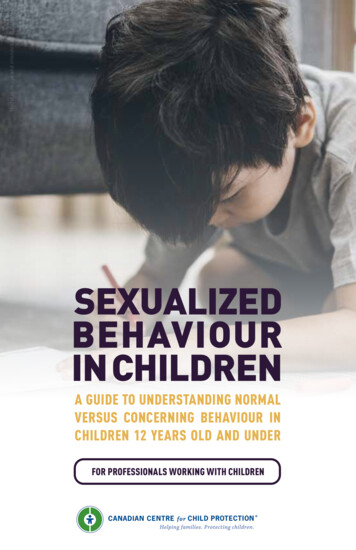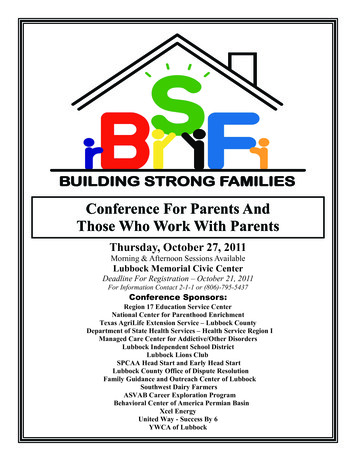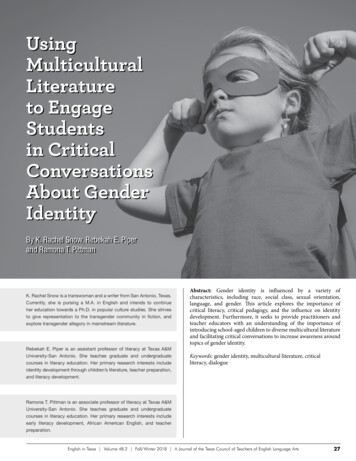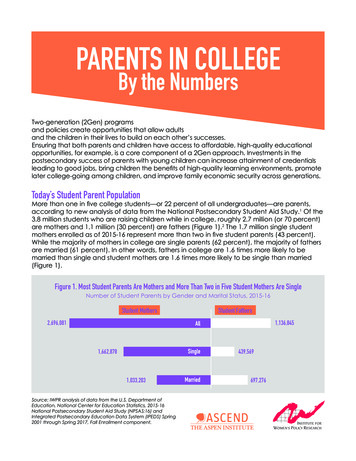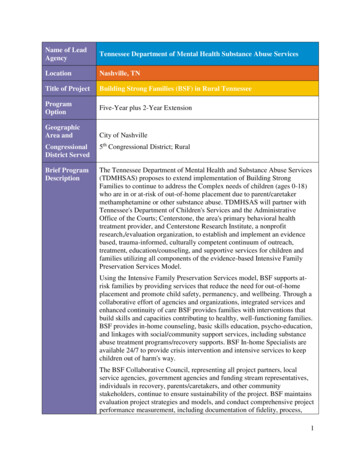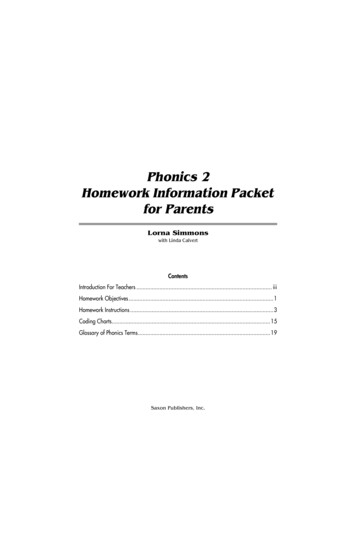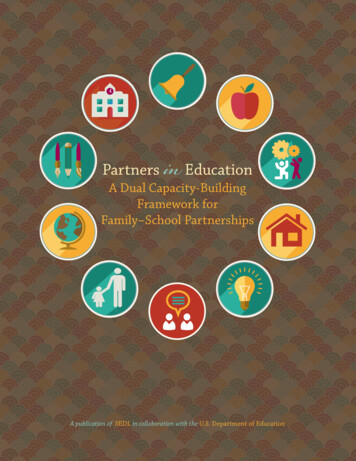
Transcription
Engaging Parents as Partners in CreatingCollege Going Cultures:Developing Parent Centers with aStrong Academic, College FocusA Practical GuideMelissa Friedman MacDonald and Aimée Dorr, UCLAMarch 2008
Engaging Parents as Partners in Creating College Going Cultures:Developing Parent Centers with a Strong Academic, College FocusA Practical GuideMelissa Friedman MacDonald and Aimée Dorr, UCLAMarch 2008Preparing students for college is a complicated process that involves multiple stakeholders at theschool site and also in the home and community. In addition to teachers and counselors, parents are apivotal part of a student’s college trajectory. It is for this reason that promoting parental involvement inthe college process continues to be an important focus for schools. Parent centers located at the schoolsite can be very effective in increasing parental engagement in students’ academic life, particularly asit relates to preparing for higher education.Traditionally, parent centers have tended to be more of a social space for networking. However, schoolsare now realizing that parent centers hold tremendous promise as vehicles for educating parents aboutinformed participation in their child’s college pathway. Prepared as part of the Building EducationalSuccess Through (BEST) Collaboration in Los Angeles County initiative, this report is intended toserve as a resource and practical guide for educators and parents who are in the process of improvingexisting parent centers and/or for those who are developing models for a future parent center. Moreinformation on the BEST Collaboration in Los Angeles County initiative and other relevant publicationsreleased by the initiative can be found at http://apep-bestla.gseis.ucla.edu/.The content of this report is drawn primarily from the November 1, 2007 BEST conference, “EngagingParents as Partners in Creating College Going Cultures: Developing Parent Centers with a StrongAcademic, College Focus.” Conference participants from five successful partnerships of schooldistricts and institutions of higher education across LA County and from the Los Angeles CountyOffice of Education provided information about existing parent centers, plans for future parent centerdevelopment, and resources for parent center work. Representatives from four regional parent centerspresented detailed descriptions of the working models behind each center’s operations. Synthesized inthis guide, these resources offer a wealth of information, practical tips, and important considerationsfor those interested in developing parent centers with a strong academic, college focus.1204047 UCLA Best report.indd 13/28/08 11:01:57 AM
Parent Centers as Vehicles for Empowering Parent Participationin the College ProcessBuilding and sustaining a parent center with a strong academic, college focus is a multifaceted process thatinvolves both parents and school staff. Building relationships with parents and creating a welcoming atmosphereare critical precursors to establishing an effective parent center. In order for parents to become actively involvedin their child’s college trajectory, they must acquire knowledge and have access to resources about how best tobe involved. Parent centers that provide college resources, information, and meaningful educational opportunitiesfor parents are most successful in empowering parents to become involved in their child’s process ofpreparing to go to college.In general, informed parents are more involved parents. Parent centers can play a pivotal role in teachingparents how to become college coaches for their children.Key Considerations and Practical Strategies forDeveloping a Parent Center Focused on Academics and College GoingCreate an Attainable Action Plan with Measurable OutcomesEstablishing a parent center with a strong academic, college focus involves planning, assessment, and ongoingadjustments. In order to effectively engage in these tasks, an action plan must be developed. Representativesfrom all major stakeholder groups (e.g., parents, administrators, teachers, counselors) should be involved inthis process.Strategies for creating an action plan include: Agreeing on a specific vision statement to guide the daily and long-term operations of the parentcenter Setting reasonable goals that have measurable outcomes Developing a mechanism for evaluating progress, one that includes identifying what data wouldneed to be collected, how to collect these data, and how to analyze the data so that the results canguide decision making about practice Using the data to revisit parent center programs and make appropriate adjustments as indicated bythe data Researching other parent centers in order to determine how (if at all) their models can inform theaction plan contentDetermine Parents’ Needs and InterestsEnsuring that resources and activities are relevant to parents is an important first step toward creating aneffective academic, college-focused parent center. Instead of a top-down approach toward developing parentprograms and educational materials, school staff should adopt a bottom-up approach and ask parents directlywhat they would like to know about the college process. Allowing parents themselves to identify the types ofknowledge and skills they need will likely increase parental involvement in the parent center and the usefulnessof whatever information and activities the center provides.2204047 UCLA Best report.indd 23/28/08 11:01:57 AM
Strategies for determining parents’ needs and interests include: Developing a questionnaire that asks parents to provide specific information about what they alreadyknow and would like to know about college eligibility requirements, admissions procedures, andfinancial aid Holding focus groups that provide parents with the opportunity to voice their concerns and ask theirquestions Utilizing the information provided by parents in the questionnaire or focus groups to plan andimplement a series of educational programs that address their needs and interestsCreate a Resource Rich, Welcoming Environment for ParentsParent centers should be a place where all parents feel welcome and comfortable. In addition to creating aninviting atmosphere, parent centers should also provide meaningful resources for parents to educate themselvesabout how to become a college advocate and advisor for their child. Achieving both of these goals requirescollaboration from different stakeholders at the school site.Strategies for creating a resource rich, welcoming parent center include: Ensuring that the parent center attends to parents’ language capabilities and needs by providing, asneeded, translated materials and translation services at events Extending to parents personal invitations to events, whenever possible utilizing, for example, theparent center liaison and/or involved parents to make calls on a telephone in the parent center Asking parents to sign in and provide their contact information for a contact list that parents canuse regularly to communicate with one another and share knowledge obtained through parent centerresources and programs Providing relevant information (e.g., testing, admissions deadlines) to parents in a timely manner andin accessible language through monthly newsletters and bulletins on the school web site Keeping the parent center open in the evening so that parents who cannot come during the day canalso access the center’s resources and programs Inviting other existing college preparatory programs, in the community or at colleges and universities,to visit the parent center and provide informationProvide Technology Access and EducationTechnology is now a gatekeeper to higher education and parents benefit from having the knowledge and skillsto use technology to access information about colleges and universities, the application process, and financialaid. For this reason, college-focused parent centers should promote informed computer/internet access anduse.3204047 UCLA Best report.indd 33/28/08 11:01:57 AM
Strategies for providing access to technology and relevant education include: Having computers with internet access available for use in the parent center Holding evening and weekend, as well as weekday, computer classes to teach parents thefollowing:o How to use the computer and navigate the web, plus how to access and use the schoolweb site, college and university web sites, and the FAFSA web siteo How to set up and maintain an email accounto How to find information about discounts and vouchers for purchasing computers andobtaining internet access Utilizing already created technology lessons for parents (e.g., AVID’s Spanish and Englishguided internet lessons about the FAFSA process and college application processes forcommunity colleges, CSUs, private colleges and universities, and UCs) Providing information about technology resources in public libraries, community centers,and the likePressing Issues for Parent CentersIn addition to the practical suggestions described in previous sections, participants from the November2007 “Engaging Parents as Partners in Creating College Going Cultures: Developing Parent Centerswith a Strong Academic, College Focus” conference also identified particular challenges in doingparent center work. The needs described in this section represent broader issues that merit specialattention when creating and improving parent center models.Important needs frequently experienced by parent centers include: Developing a stronger link between the parent center and the college center at the school siteso that the former benefits from the latter, regardless of physical distance between them andthe degree of teacher involvement in them Building connections with other parent and college centers throughout the district or regionin order to increase the resources available to all parents Creating parent programs that are inclusive of and welcoming to all parent groups, regardlessof any tensions that may exist between different groups of parents Raising funds to supplement those the school or district makes available for parent centerresources and activities4204047 UCLA Best report.indd 43/28/08 11:01:57 AM
Four Working Models of Parent Centers in Los Angeles CountyIn seeking to understand parent center work, it is useful to review examples of actual parent centers inaction. Such examples can provide concrete illustrations of how a parent center is designed, operated,and improved. The four parent center models presented in this section are those that hosted roundtablediscussions at the November 2007 “Engaging Parents as Partners in Creating College Going Cultures:Developing Parent Centers with a Strong Academic, College Focus” conference.The four parent centers were chosen for roundtables based on reputation and recommendation byconference steering committee members. The centers range in their developmental status with somewell established and others just getting started. Taken together, they illustrate the complicated processinvolved in creating and implementing high quality parent centers with a strong academic, collegefocus. The descriptions that follow are syntheses of the information contained in handouts providedby parent center representatives at the November 2007 event.Elizabeth Learning CenterElizabeth Learning Center (ELC) is a model site for the Urban Learning Centers (ULC), one of theeight designs of the New American Schools of the 21st Century. ELC is located in the city of Cudahyand a part of the Los Angeles Unified School District. The center serves over 2,700 students (preK-12thgrade). The vision of ELC is “to enable all children to learn by addressing their educational, social, andmental health needs in a comprehensive and integrated manner in collaboration with public, private,and civic partners.”The center has extended hours four days a week, operating from 7:00 am to 9:00 pm. It is managedby a team of four Community Representatives who are paid for fifteen hours per week. These staffmembers oversee the daily operations of the center and also serve as liaisons between the school andthe surrounding community. Collaborating with teachers to recruit students and parents is a regularpart of the staffs’ job, and all new recruits receive welcome kits.Unpaid parent volunteers are an important part of daily center functioning. Among other things, thesevolunteers help with fundraising for the center and with educating and mentoring other parents. Oneparent volunteer is in charge of organizing all parents. A birthday calendar is maintained for all parentvolunteers so that they can receive cards and phone calls on their birthday. This type of personaltreatment is what helps retain parent volunteers.Other important components of ELC are its comprehensive adult education program and its childcareprogram. Nearly 1,000 adults participate in the diverse classes (e.g., computers, English as a SecondLanguage) offered at the center between the hours of 7:30 am and 9:00 pm. The on-campus childcareprogram is run by parent volunteers, and parents attending classes can utilize the child care for thecost of 2 a day. These features surely help make ELC and its parent center an attractive, valuedenvironment for parents.For more information about ELC and its parent center, please contact Monica Rios at monica.rios@lausd.net or visit the ELC web site at www.eslc.k12.ca.us/homepage.htm.5204047 UCLA Best report.indd 53/28/08 11:01:57 AM
Fremont High School Parent CenterThe Fremont High School (FHS) Parent Center has been in existence for many years and has a longhistory of involving parents in school events. The center is highly collaborative and actively seeks topartner with the school college center and other community programs. In fact, much of the informationabout the CSU and UC course-taking (A-G) requirements, college applications, and financial aid isavailable to parents in the college center.Currently, the center is managed by Lisa Thompson, a Parent Liaison. She was selected by parentrepresentatives and is in charge of all daily operations. Her primary role is to seek out and provideresources that allow parents to help their children gain entry to a university, college, or communitycollege.Unpaid parent volunteers are an essential part of the FHS Parent Center. Current volunteers workwith Ms. Thompson to call other parents and/or stop them in the school hallways to invite them tocenter sponsored events. The high level of parent retention is attributed to the center’s welcomingenvironment and an ongoing effort to create activities based on parents’ needs and interests.The FHS Parent Center offers many different types of classes ranging from sewing and technology toSpanish language courses. The educational program is currently under revision, and there are plans toexpand the classes offered to parents. In addition to adult learning opportunities, the center providesparents with information about different types of resources (e.g., job services, health clinics) availableto them in the local community. The FHS Parent Center is funded through private donations fromparents and local neighborhood vendors. This funding is used to purchase materials and food forevents.For more information about the Fremont High School Parent Center, please contact Lisa Thompson atlisa.thompson@lausd.net or Kelly Bedford at kelly.bedford@lausd.net.Hawthorne High School Parent CenterThe Hawthorne High School (HHS) Parent Center opened on March 10, 2007. It is the result ofthe Program Improvement IV Restructuring-Reform Plan. Every stakeholder group in the schoolcommunity from teachers to parents was included in the development process.The HHS Parent Center is still in the beginning phases of its development. Parents are learning howto use the center and are taking advantage of the classes being offered. Examples of current coursesinclude computer awareness and usage, connecting with the internet, and troubled teen parentingstrategy sessions. The HHS Parent Center is not currently connected with the college and career centeron campus, but plans are underway for such a collaboration.A Title I Community Liaison manages the Parent Center in conjunction with a team of parent volunteers.Parent volunteers play an important role in running and improving the Center. They designed a resourcearea for parents (complete with college information), assist with translating for parents and teachers,work the phone banks to contact parents, and supervise children while parents attend meetings andworkshops.6204047 UCLA Best report.indd 63/28/08 11:01:57 AM
For more information about the Hawthorne High School Parent Center, please contact Principal JoyBramlette at 310.263.4402.South Gate High School Parent CenterSouth Gate High School (SGHS) is located in southeast Los Angeles County and serves a predominantlyLatina/o student population. Created on campus in 1991, the SGHS Parent Center began as a spacefor parents to discuss concerns and issues regarding their children’s school experiences. It receives itsfunding from multiple sources including state and federal grants and parent fundraisers. Within the lastcouple of years, the Parent Center has become a central place on campus for college preparation andeducation about eligibility requirements, admissions, and financial aid.A Community Liaison manages the Parent Center and is selected by a committee of parents. Thiscommittee develops the protocol for all interviews and is entirely responsible for the hiring process.Unpaid parent volunteers are important at the SGHS Parent Center and are recruited by parentscurrently active in the center. These parents post flyers at school and in the community and makepersonal phone calls to uninvolved parents, inviting them to attend Parent Center programs. It is thesafe and welcoming environment of the Parent Center, in addition to incentives such as raffles forDisneyland tickets, that helps retain parent volunteers.Educational workshops for parents are a large part of the work of the SGHS Parent Center. Workshopsare created based on parent interests as expressed in parent surveys sent home each year. The facilitatorsfor these workshops are parents themselves. Parent leadership training is provided in order to helpparents navigate the K-12 education system. Workshops teach parents about curriculum, standards,assessment and evaluation, and educational policies that govern the school system. The sessions areintended to empower parents to become advocates for their children, particularly with respect topreparing for college. The SGHS Parent Center also connects parents with useful resources and socialservices in the neighboring community.For more information about the South Gate High School Parent Center, please contact Mary Johnsonat mjadvocate2004@yahoo.com.ConclusionThis resource guide has presented important practical information about how to develop and maintainparent centers with a strong academic, college focus. In addition, critical issues facing those doingparent center work were identified. Four examples of parent centers in action throughout Los AngelesCounty were provided as a means of illustrating different parent center models in various stages ofdevelopment. As a whole, this practical guide is meant to serve as a useful resource for all educators,researchers, and parents interested in establishing effective parent centers and/or improving existingparent centers, particularly as they help parents ensure that their children are prepared to go tocollege.7204047 UCLA Best report.indd 73/28/08 11:01:57 AM
AppendixExisting Resources and Programs for Parents and forSchools Interested in Supporting ParentsPadres Promotores de la EducaciónThe parent promoters, or “Padres Promotores de la Educación,” actively link parents to school servicesand deliver information on higher education to the community through non-traditional methods suchas home visits, existing neighborhood associations, and informal educational dialogues. The programbegan January 2002 and is being administered by Santa Ana College. All nine Santa Ana Unified SchoolDistrict middle schools and four comprehensive high schools are participating in the program.Parents have created a curriculum that includes topics such as high school graduation requirements,university entrance requirements, AB540, financial aid, and determining student GPA. These lessonsfollow a simple template that can be followed with minimal preparation and is available in Englishand Spanish.Further Information:For more information about Padres Promotores de la Educación, contact Santa Ana College Dean ofStudent Affairs, Lilia Tanakeyowma at 714.564.6970 or via email at tanakeyowma lilia@sac.edu.Parent Academy (Los Angeles County Office of Education)Created by the Los Angeles County Office of Education (LACOE), the Parent Academy providestraining, resources, and information to further academic achievement and parent/child/school successand to support parents as leaders for effective school-site parent involvement as required by NoChild Left Behind. All presentations are conducted at the school site, are available in English andSpanish, and cover a wide range of topics including College for Success 1& 2, Parents Working withParents, Parents as First and Most Important Teachers, STAR, Standards, and More, and Helping withHomework.Further Information:For more information and a complete list of Parent Academy presentations, contact Ignacio Rojas, Jr.,Program Coordinator, by telephone at 562.922.6505 or 1.800.219.4000 or via email at rojas ignacio@lacoe.edu.Parent Collaborative (Los Angeles Unified School District Parent CommunityServices Branch)The Parent Collaborative is a product of the Los Angeles Unified School District’s Parent CommunityServices Branch (PCSB). The mission of PCSB is to promote increased student academic achievementby building the capacities of local schools and communities to train, educate, and support parents as8204047 UCLA Best report.indd 83/28/08 11:01:58 AM
partners in their children’s education. Some PCSB services include providing parents with informationon District instructional programs, publishing a Parent Press newsletter, and facilitating the Districtwide annual Parent Summit.The purpose of the Parent Collaborative is to bring together parent representatives from the LocalDistricts and organizations that show a common purpose and commitment to public education andthe health and welfare of all children in the Los Angeles Unified School District. Some of the manyresponsibilities of the Parent Collaborative include holding regular meetings, providing parent trainingand awareness through parent conferences, and highlighting the best practices for parental involvementin the Parent Press newsletter.Further Information:For more information about the Parent Collaborative and/or PCSB please email Christopher Downingat Christopher.downing@lausd.net or call 1.866.669.7272.Parent Involvement Program (Los Angeles County Office of Education)The vision of the Parent Involvement Program (PIP), developed by the Los Angeles County Office ofEducation (LACOE), is to raise the awareness of the critical role that all parents play in the academicsuccess of their children and to reinforce the importance of collaborative partnerships among schools,families, and communities. PIP seeks to build district and school capacity to increase and sustainparent involvement. As part of this program, experienced Parent Education Specialists from LACOEwill facilitate trainings on a variety of topics (e.g., Homework: Looking Beyond the Work, ParentAwareness: The Key to Academic Success) developed specifically for parents. In addition, LACOEParent Education Specialists can provide customized technical assistance in areas such as how todesign a parent involvement strategic plan and timeline.Further Information:For more information contact any of the following LACOE Parent Education Specialists: GuadalupeOrozco at 562.922.8735, Octavio Castelo at 562.922.6836, or Nelson Lopez at 562.922.8763.V-PLEX E-Parent ProgramV-PLEX E-Parent Program is an online application that revolutionizes the way that school staffcommunicate with parents. V-PLEX realizes the potential of technology to get parents more involvedwith student achievement. It teaches parents about technology and also helps bring technology intofamily homes. V-PLEX and its partners provide discounted fully loaded computers, free internet access,email, and more to families. V-PLEX also holds workshops where parents catch up on computer andemail technology as well as learn about more advanced applications in the Microsoft Office suite.Further Information:For more information about the V-PLEX E-Parent Program visit www.vplex.com or email info@vplex.com.9204047 UCLA Best report.indd 93/28/08 11:01:58 AM
AcknowledgementsThis report would not have been possible without the contributions of many people. The content of thereport drew heavily on the contributions of the attendees of the November 2007 “Engaging Parentsas Partners in Creating College Going Cultures: Developing Parent Centers with a Strong Academic,College Focus” conference; they provided many useful suggestions and ideas for good parent centerpractice. Additional contributions came from the steering committee members who planned theNovember 2007 conference.The four parent center representatives who facilitated roundtable discussions at the November 2007“Engaging Parents as Partners in Creating College Going Cultures: Developing Parent Centers with aStrong Academic, College Focus” conference provided the informational content for the Four WorkingModels of Parent Centers in Los Angeles County section. A special thank you to Monica Rios fromElizabeth Learning Center, Lisa Thompson and Kelly Bedford from Fremont High School, PrincipalJoy Bramlette from Hawthorne High School, and Mary Johnson from South Gate High School.10204047 UCLA Best report.indd 103/28/08 11:01:58 AM
Engaging Parents as Partners in CreatingCollege Going Cultures:Developing Parent Centers with aStrong Academic, College FocusA Practical GuideMelissa Friedman MacDonald and Aimée Dorr, UCLAMarch 2008
Elizabeth Learning Center Elizabeth Learning Center (ELC) is a model site for the Urban Learning Centers (ULC), one of the eight designs of the New American Schools of the 21st Century. ELC is located in the city of Cudahy and a part of the Los Angeles Unified School District. The center serves over 2,700 students (preK-12th grade).


